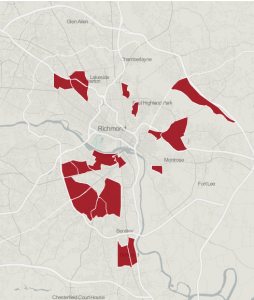by James A. Bacon
Why do people get obese? One widely circulated explanation is that many Virginians, poor people especially, live in “food deserts” — places where they do not have access to grocery stores that provide fresh, healthy food. Deprived of choice, these unfortunates get their food wherever they can, such as fast food chains, convenience stores and corner markets where fresh fruits and vegetables are unavailable. In this view, many obese people are victims. The problem isn’t people’s lack of discipline or will power, in this view, it’s the unwillingness of grocery stores to locate in their neighborhoods.
Is that accurate? Is obesity really the fault of uncaring corporate grocery store chains that discriminate against poor neighborhoods? Put in terms that an economist could appreciate, are food deserts caused by supply-side restrictions on nutritious food.. or by insufficient demand for it?
The U.S. Department of Agriculture defines a food desert as a low-income census tract where a substantial number of residents have low access (more than one mile from a grocery store in urban areas, 10 miles in rural areas) and has identified 6,529 such tracts (out of 172,772) in the continental U.S. USDA also has published a food desert locator tool so you can find the food deserts near you.
Fortunately for Bacon’s Rebellion readers, Susan Clapp has done all the hard work for us, making the Virginia data accessible through the Weldon Cooper Center’s Demographics & Workforce blog. She loaded the Virginia data on this map, color coding urban deserts in red and rural deserts in tan. The graphic at the top of this post was captured from that map.
According to Clapp, USDA has identified 325,000 Virginians, or roughly 5% of the population, as having low access to grocery stores. But 26.4% of the Old Dominion’s population is obese, according to Virginia Performs data. Clearly, food deserts can account for only a small part of the problem, if any at all. If four out of five obese Virginians live in proximity to grocery stores, ready access to fruit and vegetables is not the problem.
The problem can’t be blamed upon insufficient education. Kids learn about good nutrition in school, and they get bombarded with media messages and public service announcements throughout their lives. Everybody knows how to keep the weight off. They just don’t exercise the discipline and will power to do it. People choose to spend their money on processed and packaged foods that are tasty and easy to prepare.
If poor people really wanted fresh food, entrepreneurs would meet the demand. Indeed, most food deserts are served by corner stores and convenience stores that stock foodstuffs that people purchase in small quantities. When I lived in Church Hill many moons ago, I patronized such a store, a Korean-owned corner shop with a small vegetable section in the back. The store did sell fruit and vegetables, although I must say they did not look terribly appetizing.
I suppose you could argue that no one wants buy wilting vegetables, so we shouldn’t blame the poor people of Church Hill for their lousy nutrition. Here’s my response to that: If poor people living in food deserts are truly under-served by the marketplace, an opportunity exists for enterprising do-gooders to meet the latent demand for fresh food. Go for it. Open your own corner store. Stock it with fresh fruits and vegetables and charge a fair price. Let’s see how long you stay in business.



